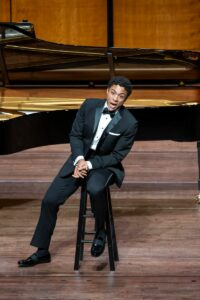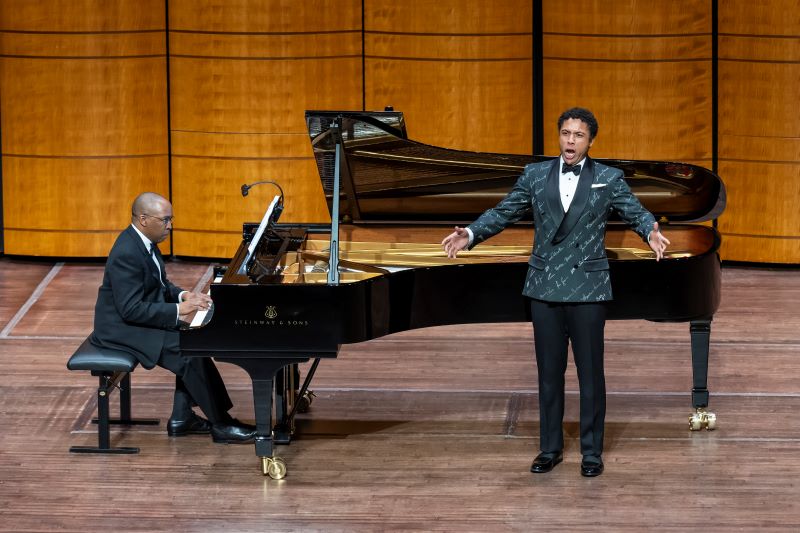IN RECITAL: Baritone Justin Austin performed a program of wide-ranging emotions.
(Photos: Scott Suchman)
by Patrick D. McCoy
Each year, Washington National Opera recognizes an outstanding vocal artist with the Marian Anderson Vocal Award. This year’s recipient of the award is baritone Justin Austin. The accomplished singer recently starred in the company’s production of Gounod’s “Romeo and Juliet.” His career has already been characterized by several prestigious debuts, including his Carnegie Hall recital debut several years ago. He will return to that hall with pianist Howard Watkins, who joined him in recital for this concert.
His recital in The Terrace Theater was one that, for many singers carry a great weight and responsibility. The great contralto Marian Anderson was a trailblazing artist who for many paved the way for Black singers to excel in the realm of opera and classical music. Austin carried that tradition forward in his own special way as he too lifted his generation of singers by his sterling example. What was truly unique was the innovative way in which he curated his own story through the music. The evening of song was of a contemporary fare. Beginning with the exciting composer Shawn Okpebholo’s setting of the spiritual “O Freedom” the program was centered by the fervent a cappella solo line. As the piece progressed, the piano accompaniment, supported ably by Howard Watkins underscored the probing text with the percussive lower register of the instrument. As the piece swelled, Austin’s voice particularly marked the text ‘No more cryin.’ Full of vocal resonance and emotional pathos, it was almost hard for the audience to contain itself. It was clear that Okpeholo’s piece had a very intentional positioning in opening such a significant recital.
Maurice Ravel’s song cycle “Don Quichotte a Dulcinee” presented Austin the opportunity to convey a wide range of emotions: the joy of love, gentlemanly nobility and the joviality of liquid spirits. Using the entire stage, with every gesture of his body, the voice took on a distinct characteristic in the three song set. The repertoire for this program in many ways pushed the envelope in many ways. A perfect example was “Embrace the Fascists” by Hanns Eisler in which the text calls into question of how in the face of behavior that is sometimes unpleasant, we are called to still be ‘the bigger person.’ With each iteration of the text, the firm playing at the piano by Watkins seemed to punctuate the emphasis in Austin’s voice. One could not help but sit and reflect on the quiet dignity that Miss Anderson exhibited in her own restraint. He ended the first half with “Ballad of the Easy Life” and “Call From the Grave” from the “Threepenny Opera” by Kurt Weill.
entire stage, with every gesture of his body, the voice took on a distinct characteristic in the three song set. The repertoire for this program in many ways pushed the envelope in many ways. A perfect example was “Embrace the Fascists” by Hanns Eisler in which the text calls into question of how in the face of behavior that is sometimes unpleasant, we are called to still be ‘the bigger person.’ With each iteration of the text, the firm playing at the piano by Watkins seemed to punctuate the emphasis in Austin’s voice. One could not help but sit and reflect on the quiet dignity that Miss Anderson exhibited in her own restraint. He ended the first half with “Ballad of the Easy Life” and “Call From the Grave” from the “Threepenny Opera” by Kurt Weill.
After the intermission, retiring his classic black tuxedo jacket, Austin returned to the stage where a double-breasted coat adorned in the signatures of legendary Black operatic trailblazers. In “Song for a Dark Girl” by Ricky Ian Gordon, Austin languished in each note. Ranging from a well-placed portamento to the crescendo of each phrase, there was a feeling of uncertainty conveyed in the Langston Hughes text. The program continued with Marvin Gaye Songs “Mercy” and “Sugar” set by Gordon. In “Sugar” there was such a buildup in the text, especially when he so eloquently essayed the text “poets, musicians, fu*cked up thinkers, mean mofos.” If there was any doubt of Austin’s ability to communicate as an artist, these songs put any notion to rest.
Closing the evening was the song cycle “Mortal Storm, Op. 29” by Robert Owens. The five songs were like mini-scenes, with each communicating a different idea. The perfect partner at the piano, Howard Watkins was with Austin’s voice at every moment, equally a partner in the storytelling. The final song “Genius Child” seemed to underscore many emotions as it stated “This is a song for the genius child.” Amid the ebb and flow of the latter part of the text, Austin offered an evening of song that expressed the full range of his instrument. We eagerly await the journey ahead.
A native of Petersburg, VA, Patrick holds a BM in Vocal Performance from Virginia State University and a MM in Church Music from Shenandoah Conservatory. Formerly the Performing Arts Columnist for Washington Life Magazine, he currently is a freelance writer, publishing articles for several noted publications and organizations, including The Washington Post, Early Music America, Classical Music Voice North America, The Afro-American Newspaper, Prince George’s Suite Magazine, CBS Washington, Examiner.com and Washington Classical Review. He holds membership in the Music Critics Association of North America, National Association of Negro Musicians, Inc., American Choral Directors’ Association, Association of Anglican Musicians, a former member of the Shenandoah University Alumni Board of Directors, a member of the Shenandoah University Black Alumni Network, a Life Member of Alpha Phi Alpha Fraternity, Inc. and a member of the Sigma Zeta Chapter of Phi Mu Alpha Sinfonia Fraternity of America. As an alumnus of Shenandoah, he was named to the Dean’s Circle of the Shenandoah Conservatory Advisory Board. He enters his 7th year as Organist/Choirmaster at Saint John’s Episcopal Church, Zion Parish in Beltsville, MD and is the newly hired Development and Communications Manager for Washington Conservatory of Music in Glen Echo, MD. Patrick is the host of “Across the Arts” both a live and virtual media platform covering the performing arts. Visit http://patrickdmccoy.com and follow him on Facebook and Twitter @PatrickDMcCoy, IG: PDM06. and subscribe to “Across the Arts” on YouTube.

